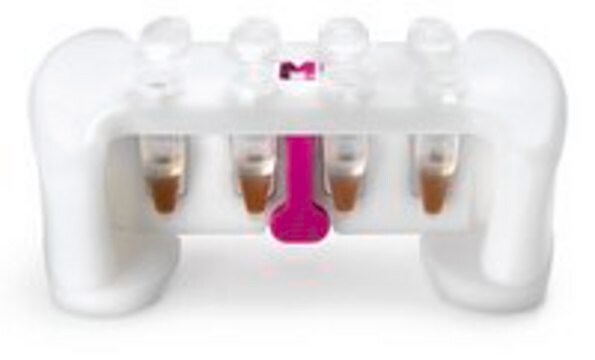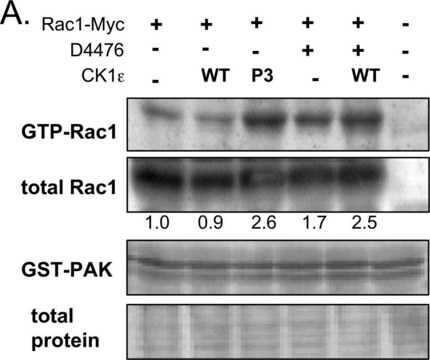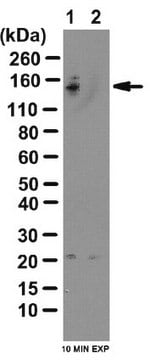17-613
ChIPAb+ p53 - ChIP Validated Antibody and Primer Set
from mouse
Se connecterpour consulter vos tarifs contractuels et ceux de votre entreprise/organisme
About This Item
Code UNSPSC :
12352203
eCl@ss :
32160702
Nomenclature NACRES :
NA.52
Produits recommandés
Description générale
All ChIPAb+ antibodies are individually validated for chromatin precipitation, every lot, every time. Each ChIPAb+ antibody set includes control primers (tested every lot by qPCR) to biologically validate your IP results in a locus-specific context. The qPCR protocol and primer sequences are provided, allowing researchers to validate ChIP protocols when using our antibody in their chromatin context. Each set also includes a negative control antibody to ensure specificity of the ChIP reaction.
The ChIPAb+ p53 set includes the p53 antibody raised against recombinant human p53, the negative control antibody (mouse normal IgG), and qPCR primers flanking an Sp1 binding site (to which p53 can be recruited1) within the human p21 (WAF1/CIP1/CDKN1A) promoter, amplifying a 105 base pair PCR product. The p53 and negative control antibodies are supplied in a scalable "per ChIP" reaction size and can be used to functionally validate the precipitation of p53 associated chromatin.
The ChIPAb+ p53 set includes the p53 antibody raised against recombinant human p53, the negative control antibody (mouse normal IgG), and qPCR primers flanking an Sp1 binding site (to which p53 can be recruited1) within the human p21 (WAF1/CIP1/CDKN1A) promoter, amplifying a 105 base pair PCR product. The p53 and negative control antibodies are supplied in a scalable "per ChIP" reaction size and can be used to functionally validate the precipitation of p53 associated chromatin.
Spécificité
Recognizes p53 in wild type and mutant forms of human origin.
Application
Chromatin Immunoprecipitation Analysis:
Sonicated chromatin prepared from untreated or actinomycin D treated (30 ng/mL, 6 hrs.) U2OS cells (3 X 106 cell equivalents per IP) was subjected to chromatin immunoprecipitation using 1 μg of mouse Anti-p53 and the Magna ChIP® G (Cat. # 17-611) Kit. Immunoprecipitation of p53 associated DNA fragments was verified by qPCR using ChIP Primers p21 flanking the human p21 promoter that contains an Sp1 binding site (Please see figures).
Fold Increase is a ratio of normalized mean IP quantities extracted from standard curves derived from inputs of each chromatin sample. As previously published, p53 association with this region of the p21 promoter increases upon actinomycin D treatment.
Chromatin Immunoprecipitation Analysis:
Sonicated chromatin prepared from untreated or UV treated (6 hrs, 50 joules/m2.) U2OS cells (3 X 106 cell equivalents per IP) was subjected to chromatin immunoprecipitation using 1 μg of mouse Anti-p53 and the Magna ChIP A (Cat. # 17-610) Kit.
Immunoprecipitation of p53 associated DNA fragments was verified by qPCR using ChIP Primers p21 flanking the human p21 promoter that contains an Sp1 binding site (Please see figures).
Fold Increase is a ratio of normalized mean IP quantities extracted from standard curves derived from inputs of each chromatin sample. p53 immunoprecipitable activity associated with this promoter increases with UV treatment as observed in other studies.
Sonicated chromatin prepared from untreated or actinomycin D treated (30 ng/mL, 6 hrs.) U2OS cells (3 X 106 cell equivalents per IP) was subjected to chromatin immunoprecipitation using 1 μg of mouse Anti-p53 and the Magna ChIP® G (Cat. # 17-611) Kit. Immunoprecipitation of p53 associated DNA fragments was verified by qPCR using ChIP Primers p21 flanking the human p21 promoter that contains an Sp1 binding site (Please see figures).
Fold Increase is a ratio of normalized mean IP quantities extracted from standard curves derived from inputs of each chromatin sample. As previously published, p53 association with this region of the p21 promoter increases upon actinomycin D treatment.
Chromatin Immunoprecipitation Analysis:
Sonicated chromatin prepared from untreated or UV treated (6 hrs, 50 joules/m2.) U2OS cells (3 X 106 cell equivalents per IP) was subjected to chromatin immunoprecipitation using 1 μg of mouse Anti-p53 and the Magna ChIP A (Cat. # 17-610) Kit.
Immunoprecipitation of p53 associated DNA fragments was verified by qPCR using ChIP Primers p21 flanking the human p21 promoter that contains an Sp1 binding site (Please see figures).
Fold Increase is a ratio of normalized mean IP quantities extracted from standard curves derived from inputs of each chromatin sample. p53 immunoprecipitable activity associated with this promoter increases with UV treatment as observed in other studies.
Research Category
Epigenetics & Nuclear Function
Epigenetics & Nuclear Function
Research Sub Category
Chromatin Biology
Chromatin Biology
This ChIPAb+ p53 -ChIP Validated Antibody & Primer Set conveniently includes the antibody & the specific control PCR primers.
Conditionnement
25 assays per kit. ~1 μg per chromatin immunoprecipitation
Qualité
Routinely evaluated by chromatin immunoprecipitation and immunoblot on RIPA lysate of human Raji cells.
Description de la cible
53 kDa
Forme physique
Anti-p53 (mouse monoclonal IgG). One vial containing 25 μg of of protein A purified mouse IgG2a in 25 μL of storage buffer (PBS, pH 7.4, containing 0.05% sodium azide and 1 mg/mL BSA). Store at -20°C.
Normal Mouse IgG. One vial containing 25 μg of normal mouse IgG in 25 μL volume. Store at -20°C.
ChIP Primers p21. One vial containing 75 μL of 5 μM of each primer specific for a region of the human p21 (WAF1/CIP1/CDKN1A) promoter. Store at -20°C.
FOR: GTG GCT CTG ATT GGC TTT CTG
REV: CTG AAA ACA GGC AGC CCA AG
Normal Mouse IgG. One vial containing 25 μg of normal mouse IgG in 25 μL volume. Store at -20°C.
ChIP Primers p21. One vial containing 75 μL of 5 μM of each primer specific for a region of the human p21 (WAF1/CIP1/CDKN1A) promoter. Store at -20°C.
FOR: GTG GCT CTG ATT GGC TTT CTG
REV: CTG AAA ACA GGC AGC CCA AG
Format: Purified
Protein A purified
Stockage et stabilité
Stable for 1 year at -20°C from date of receipt
Remarque sur l'analyse
Control
Included negative control antibody mouse normal IgG and control primers specific for human p21 (WAF1/CIP1/CDKN1A) promoter.
Included negative control antibody mouse normal IgG and control primers specific for human p21 (WAF1/CIP1/CDKN1A) promoter.
Informations légales
MAGNA CHIP is a registered trademark of Merck KGaA, Darmstadt, Germany
UPSTATE is a registered trademark of Merck KGaA, Darmstadt, Germany
Clause de non-responsabilité
Unless otherwise stated in our catalog or other company documentation accompanying the product(s), our products are intended for research use only and are not to be used for any other purpose, which includes but is not limited to, unauthorized commercial uses, in vitro diagnostic uses, ex vivo or in vivo therapeutic uses or any type of consumption or application to humans or animals.
Code de la classe de stockage
10 - Combustible liquids
Certificats d'analyse (COA)
Recherchez un Certificats d'analyse (COA) en saisissant le numéro de lot du produit. Les numéros de lot figurent sur l'étiquette du produit après les mots "Lot" ou "Batch".
Déjà en possession de ce produit ?
Retrouvez la documentation relative aux produits que vous avez récemment achetés dans la Bibliothèque de documents.
Mai Nhu Uyen Le et al.
Data in brief, 50, 109499-109499 (2023-09-04)
The tumor suppressor p53 exerts its role mainly as a transcription factor. The TP53 gene, which encodes the p53 protein, is the most commonly mutated gene in human cancers, particularly triple negative breast cancer (TNBC). Variations in the TP53 gene
Neha Parikh et al.
The Journal of pathology, 232(5), 522-533 (2014-01-01)
Mutations in the TP53 tumour suppressor gene occur in half of all human cancers, indicating its critical importance in inhibiting cancer development. Despite extensive studies, the mechanisms by which mutant p53 enhances tumour progression remain only partially understood. Here, using
Martina Rossi et al.
Nucleic acids research, 52(12), 7261-7278 (2024-05-09)
RNA modifications, including N6-methyladenosine (m6A), critically modulate protein expression programs in a range of cellular processes. Although the transcriptomes of cells undergoing senescence are strongly regulated, the landscape and impact of m6A modifications during senescence are poorly understood. Here, we
Yap Ching Chew et al.
The Journal of biological chemistry, 287(20), 16168-16178 (2012-03-20)
Sulforaphane (SFN) is an important cancer preventive agent derived from cruciferous vegetables. We show that SFN treatment suppresses normal human keratinocyte proliferation via a mechanism that involves increased expression of p21(Cip1). SFN treatment produces a concentration-dependent increase in p21(Cip1) promoter
Peng Qi et al.
International journal of cancer, 137(6), 1269-1278 (2015-03-15)
Recently, long noncoding RNAs (lncRNAs) were demonstrated to play important regulatory roles in biological processes and cancer biology. However, the overall pathophysiological contribution of lncRNAs to gastric cancer (GC) remains largely unknown. In this study, differentially expressed lncRNAs in GC
Notre équipe de scientifiques dispose d'une expérience dans tous les secteurs de la recherche, notamment en sciences de la vie, science des matériaux, synthèse chimique, chromatographie, analyse et dans de nombreux autres domaines..
Contacter notre Service technique








